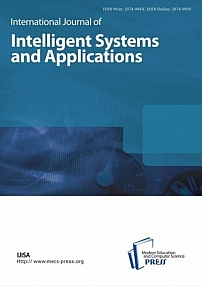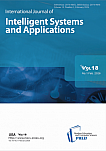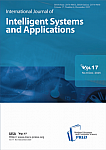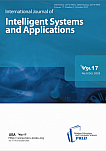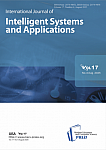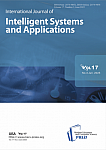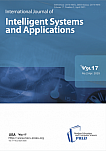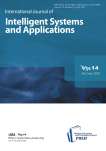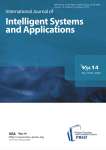International Journal of Intelligent Systems and Applications @ijisa
International Journal of Intelligent Systems and Applications
International Journal of Intelligent Systems and Applications (IJISA) is a peer reviewed journal in the field of Intelligent Systems and Applications. The journal is published 12 issues per year by the MECS Publisher from 2012. All papers will be blind reviewed. Accepted papers will be available on line (free access) and in printed version. No publication fee.
IJISA is publishing refereed, high quality original research papers in all areas of Intelligent Systems and Applications.
IJISA has been indexed by several world class databases: Scopus, Google Scholar, Microsoft Academic Search, CrossRef, DOAJ, IndexCopernicus, INSPEC(IET), EBSCO, JournalSeek, ULRICH's Periodicals Directory, WordCat, Scirus, Academic Journals Database, Stanford University Libraries, Cornell University Library, UniSA Library, CNKI Scholar, ProQuest, J-Gate, ZDB, BASE, OhioLINK, iThenticate, Open Access Articles, Open Science Directory, National Science Library of Chinese Academy of Sciences, The HKU Scholars Hub, etc...
The journal publishes original papers in the field of Intelligent Systems and Applications which covers, but not limited to the following scope:
Neural Networks
Evolutionary Computing and Genetic Algorithms
Fuzzy Systems and Soft Computing
Ant Colony Optimization
Particle Swarm Optimization
Artificial Fish School Algorithm
Artificial Life and Artificial Immune Systems
Systems Biology and Neurobiology
Support Vector Machine
Rough and fuzzy rough set
Knowledge Discovery and Data Mining
Kernel Methods
Supervised & Semi-supervised Learning
Cloud Computing
Evolutionary learning systems
Hybrid System
Man-Machine Interaction
CIMS and Manufacturing Systems
Factory Modeling and Simulation
Instrumentation Systems
Network-based Systems
Scheduling and Coordination
Process Automation
Automobile Electric
Sensor Fusion
Intelligent Mechatronics and Robotics
Intelligent Automation
Knowledge Management and Knowledge Engineering
Management Information Systems
Management of Supply Chain and Logistics
Financial Data Mining
Customer Relationship Management
Web Data Mining
Games Theory
System Theory and Control Theory
Nonlinear System and Control
Bayesian Network
Pervasive Computing
Modeling, Identification and Signal Processing
Fuzzy System and Fuzzy Control
Distributed Control Systems
Adaptive Control and Learning Control
Robust and H-infinity Control
Traffic Control
Communication Network Systems
Intelligence System Design
Modern Education & Computer Science Press
Выпуски журнала
Статьи журнала
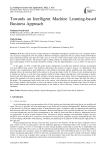
Towards an Intelligent Machine Learning-based Business Approach
Статья научная
With the constant increase of data induced by stakeholders throughout a product life cycle, companies tend to rely on project management tools for guidance. Business intelligence approaches that are project-oriented will help the team communicate better, plan their next steps, have an overview of the current project state and take concrete actions prior to the provided forecasts. The spread of agile working mindsets are making these tools even more useful. It sets a basic understanding of how the project should be running so that the implementation is easy to follow on and easy to use. In this paper, we offer a model that makes project management accessible from different software development tools and different data sources. Our model provide project data analysis to improve aspects: (i) collaboration which includes team communication, team dashboard. It also optimizes document sharing, deadlines and status updates. (ii) planning: allows the tasks described by the software to be used and made visible. It will also involve tracking task time to display any barriers to work that some members might be facing without reporting them. (iii) forecasting to predict future results from behavioral data, which will allow concrete measures to be taken. And (iv) Documentation to involve reports that summarize all relevant project information, such as time spent on tasks and charts that study the status of the project. The experimental study carried out on the various data collections on our model and on the main models that we have studied in the literature, as well as the analysis of the results, which we obtained, clearly show the limits of these studied models and confirms the performance of our model as well as efficiency in terms of precision, recall and robustness.
Бесплатно
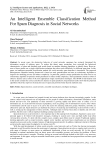
An Intelligent Ensemble Classification Method For Spam Diagnosis in Social Networks
Статья научная
In recent years, the destructive behavior of social networks spammers has seriously threatened the information security of ordinary users. To reduce this threat, many researchers have extracted the behavioral characteristics of spam and obtained good results based on machine learning algorithms to identify them. However, most of these studies use a single classification technique that often works differently for different spam data. In this paper, an intelligent ensemble classification method for social networks spam detection is introduced. The proposed heterogeneous ensemble learning framework is based on stack generalization and uses an evolutionary algorithm to improve the modeling process and reduce complexity. In particular, particle swarm optimization has been used as an evolutionary algorithm to optimize model parameters to reduce model complexity. These parameters include a subset of effective features and a subset of the most appropriate single classification techniques. The SPAM E-mail dataset used in this article contains the correct and effective features in spam prediction. Experimental results show that the proposed algorithm effectively improves the detection rate of spam and performs better than the methods used.
Бесплатно
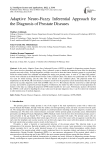
Adaptive Neuro-Fuzzy Inferential Approach for the Diagnosis of Prostate Diseases
Статья научная
In this study, Adaptive Neuro-fuzzy Inferential System (ANFIS) is adapted for diagnosing prostate diseases. The system involves generating and tuning a fuzzy inference system to handle the imprecise terms used for describing prostate cases and severity. Several diagnostic variables were used to learn the feature statistics present in a typical data, while the trained model was validated and adapted for testing new prostate cases. A total of 335 data from patients’ records were collected at the Medi Moses Prostate Centre, Kumasi Ghana. The dataset was partitioned into 70% which was used for model training, and the other 30% was utilized in the validation phase. The proposed model was implemented in the MATLAB environment. Evaluation result from the proposed system demonstrated that the system achieved an accurate diagnostic result with an RMSE value of 11%. This indicates that the system has a relatively high accuracy and could be accepted for prostate diagnosis. Furthermore, the model was able to learn well and generalize the features in the data set, making the proposed ANFIS model suitable for new cases. Performance analysis showed that the ANFIS is well suited for handling the crispy values used in prostate diagnosis; thus, it can be extensively employed in other similar areas of medical diagnosis.
Бесплатно
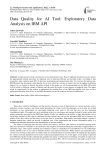
Data Quality for AI Tool: Exploratory Data Analysis on IBM API
Статья научная
A huge amount of data is produced in every domain these days. Thus for applying automation on any dataset, the appropriately trained data plays an important role in achieving efficient and accurate results. According to data researchers, data scientists spare 80% of their time in preparing and organizing the data. To overcome this tedious task, IBM Research has developed a Data Quality for AI tool, which has varieties of metrics that can be applied to different datasets (in .csv format) to identify the quality of data. In this paper, we will be representing how the IBM API toolkit will be useful for different variants of datasets and showcase the results for each metrics in graphical form. This paper might be found useful for the readers to understand the working flow of the IBM data purifier tool, thus we have represented the entire flow of how to use IBM data quality for the AI toolkit in the form of architecture.
Бесплатно

